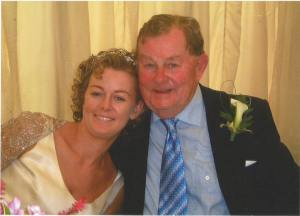My wonderful Dad, Richard Watson, passed away recently from complications related to vascular dementia, writes Fiona Flores Watson. He was diagnosed five years ago, and his journey was, like that of most suffering from the disease, at times very painful for those of us closest to him.
When my articulate, sharp-minded father started to forget words – sometimes just the occasional one, sometimes a fair number on any given day – I thought something was up. At the time of his diagnosis, then in his early 80s and otherwise healthy, he could still communicate almost normally with us. Apart from the aphasia (losing words), he had some short-term memory loss – he would repeat the same question (asking me at five-minute intervals, “Where do you live?”), not remembering where he’d put things (glasses, wallet), forgetting what he’d just told us – the typical early symptoms.
The obvious advice is to make the most of those early months and years after diagnosis. I asked Dad about his childhood (he was born in what is now Pakistan), youth and military service, and we spent memorable afternoons sitting together in the garden while he recalled those days from 60 or 70 years ago with great relish. That “interview”, with extraordinary detail from his early years, will be of comfort as we remember him in years to come. I dearly wish I had recorded his voice too – apparently listening to this in the later stages of the disease can provide reassurance.
Those were the moments which we knew we had to treasure, while he still understood where he was, and who we were, while he could still appreciate his beloved wine and whisky, and enjoy food and friends. Most importantly, for me as a mother of two young children, I wanted them to spend time with their grandfather. Children always love my Dad, with his soft voice, ready smile and love for singing nursery rhymes and reading them Beatrix Potter books.
Music provided him with huge pleasure, especially jazz and opera, right throughout the disease. His whole face would change – no need for those fiddly old words now, I can just listen and lose myself. Another great pleasure was animals. He has always loved dogs and horses, but the relationship becomes so much more valuable when verbal communication is challenging, and the struggle for words so painful. Here are affectionate creatures who ask for nothing and give everything. We didn’t have any pets at home, but we often visited farm parks, or talked to dogs we met on the street.
As the disease moved into its mid-stages, he got very agitated when he lost his keys, handkerchief or glasses. He stopped driving, and for a while went for walks alone in the village, until he got too confused, and then we had to lock the front door of the house. He couldn’t be left alone in the house, or in a car, so Mum organised regular respite care (partly using her carer’s allowance) to give herself a break. Often this was simply to do the shopping alone.
By this point, Dad wasn’t sure who I was any more, and didn’t know his grandchildren. We would all chat to him, play him his favourite music, and his old friends would visit, but it’s at this stage that I would wonder what’s going on in his head? Does he wonder where he is, and who I am? Or is he just content to be? What would he think if he saw himself now? So many questions with dementia, and so few answers.
Last year as Dad became more distressed, with falls necessitating ambulance calls, and my mother exhausted emotionally and physically, we decided it was time for him to go into a care home. This was not a decision we took lightly, but my Mum had looked after him diligently for many years, and couldn’t carry on. She didn’t want a live-in carer, so we found a specialist dementia care home in a local town. Inevitably there was a feeling of guilt, but how much worse would we have felt if the situation had also affected my mum’s health, as well as her wellbeing?
We put colourful posters and blown-up family pictures on the wall of his room, set up a CD player, and he settled in quickly. My Mum visited him every few days. He loved the music entertainers, the Pets As Therapy visits, and had an existence of calm routine. I took my children in to see him, and although he hadn’t recognised them for years, or me for quite a while, we would sing him his favourite songs, and he’d join in. At Christmas, we took him his favourite boxes of chocolates, and we ate them together. And we sang.
When Dad passed away, exactly a year after he arrived at the home, it was mercifully quick and he didn’t suffer. We will be remembering him at a memorial service next week, as a devoted and loving husband, brother, father, and grandfather. My son will sing a favourite nursery rhyme.
My own grieving for my Dad started many years ago, when he starting slipping away from us, a long and dreadfully painful process, but losing him was still a devastating blow. With dementia sufferers increasing – more than 800,000 in the UK – I can only hope that they find a cure soon for this vile, destructive disease.
Fiona Flores Watson is a freelance journalist, editor and social media manager. Follow her on Twitter @Seville_Writer

Wonderful post Fiona. So sorry for your loss but glad that you have managed to process it so well and that you have shared your experience so beautifully. Your words will be of great help to many x